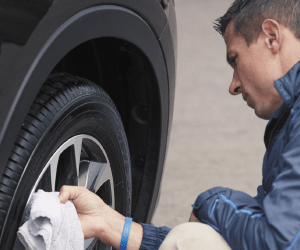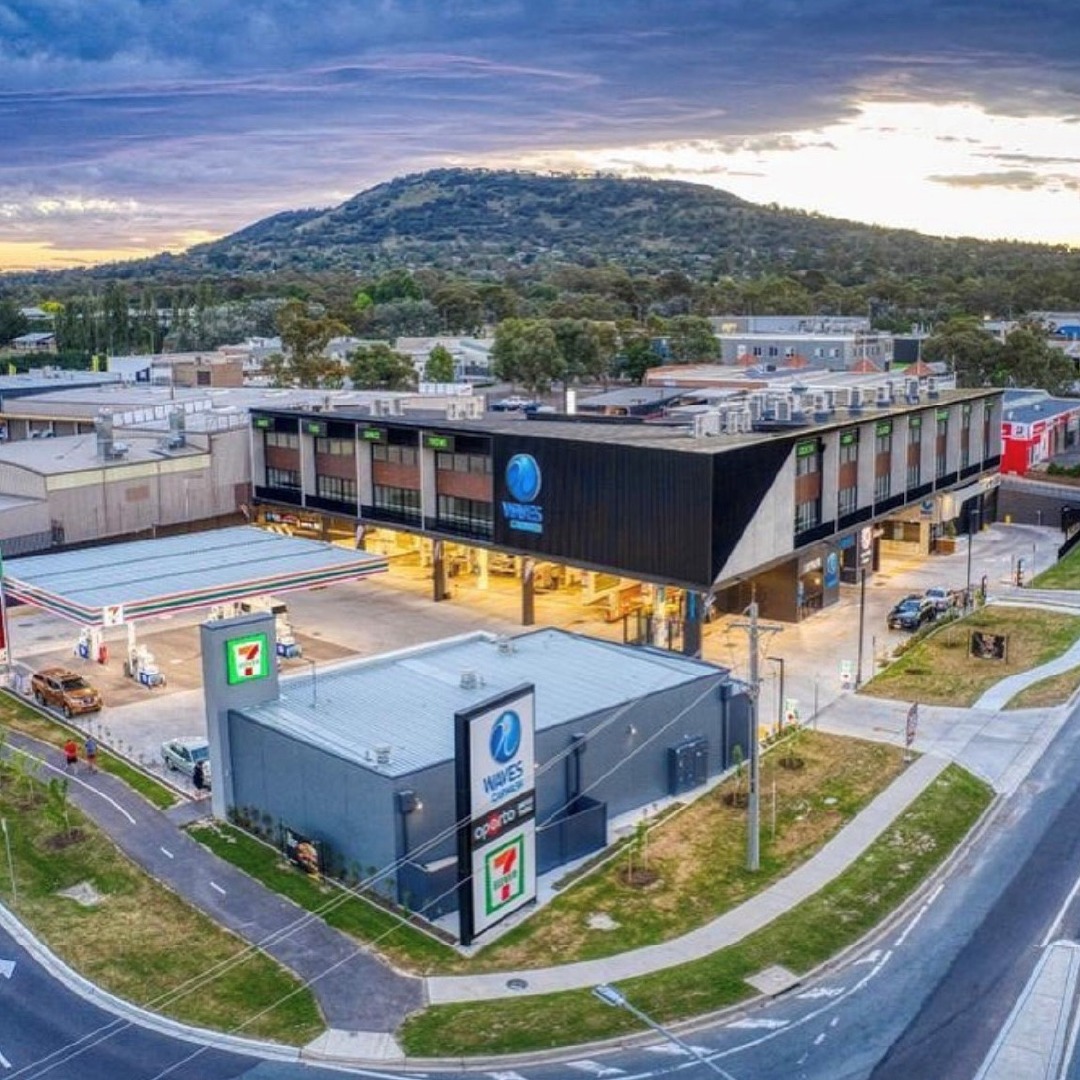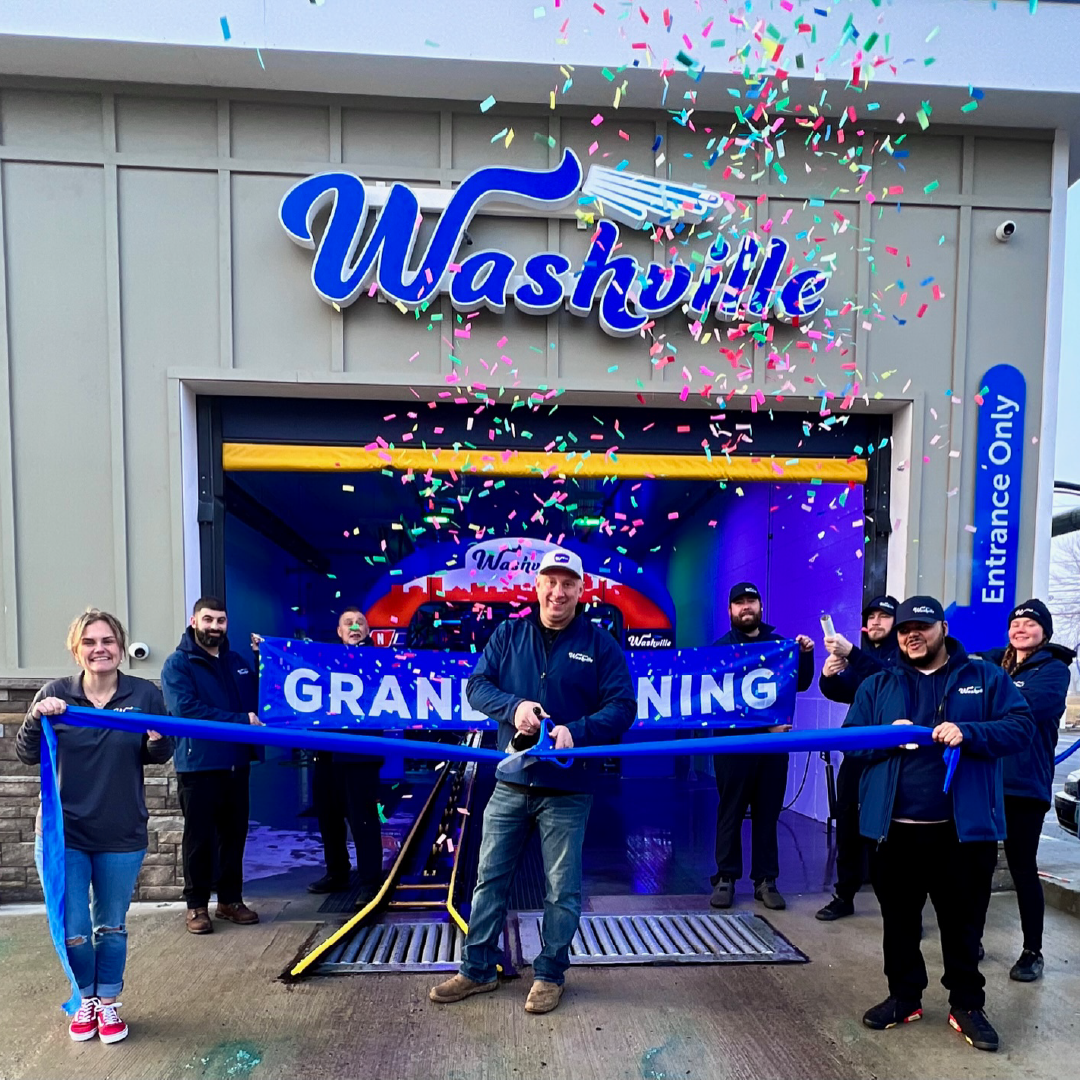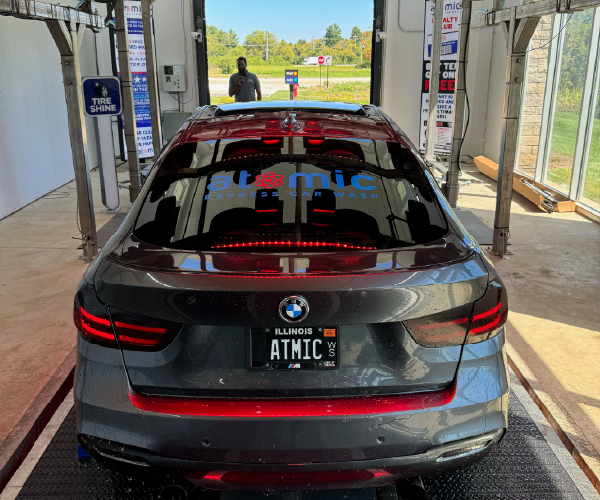
Waterway Gas & Wash
November 7, 2017
10 minute ReadWaterway Gas & Wash is a full-service car wash company with gas pumps and a full convenience store with 20 locations in five states. For a company founded by people who wanted an investment that would be easy to run, the company has turned into a place of incredibly hardworking, dedicated people from its frontline staff up to its president and CEO.
And that’s by design.
The Waterway History
Henry Dubinsky co-founded Waterway Gas & Wash in the late 1960s with a group of friends looking for a simple investment. “Of course, we picked the car wash business, but we were very wrong about whether it would be hard to run,” Henry said. “We thought it could be run without any of us in the business, but after a short time, we decided otherwise.”
Henry decided to join the business full-time, quitting his career as a lawyer and CPA at the age of 31 in 1972. For Henry, finding a way to differentiate the company from others in the industry was important. “From the beginning, we chose to bring in what we thought would be a more professional approach to the industry,” he said. “We also wanted to have very striking locations, which is something we continue to do today.”
In the beginning, Waterway was a company of exterior car washes, with its first location in Kirkwood, Mo. Over time, the company began to expand, from the St. Louis area to Kansas City, Mo. In 1999, they expanded to Denver; in 2008, to Cleveland; and in 2015, to Chicago. “As we grew and developed, our locations became full-service locations in areas that were limited in availability for other competitors,” Henry said. The transition to full-service wasn’t complete until the early 1990s.
“We knew that the full-service segment was a harder segment to manage,” Henry said. “And that’s the risk. But that’s our competitive advantage today. While it is hard to manage, we think we’re good at managing it, which again differentiates us from our competitors.”
Henry’s son, Bob, who today is Waterway’s President and CEO, agrees about the complexity and differentiation the full-service model provides.
“The particular mix we have of full-service washing and high-volume gasoline plus a convenience store is definitely more challenging than doing any one of those three things,” Bob said. “It’s difficult to be awesome at something challenging, but it’s also a lot of fun to do it and succeed.”
Bob is pretty familiar with the business: he grew up with the business while his father ran it, and joined the company himself when he was in his early teens. “I officially started with Waterway the week after I turned 14, working at the location closest to my house so I could ride my bike,” Bob said. “I started by working the line and drying, vacuuming and cleaning cars.”
Bob continued his part-time career with Waterway throughout college and before leaving for graduate school. As he contemplated what his future might hold, Waterway was always on his mind. “I kept coming back to how Waterway was the one thing I really wanted to do,” he said. “I always loved working at Waterway, and always enjoyed having such close contact with my customers. In the full-service car wash business, you’re never more than a couple feet away from your customer. The idea of being outside the exit of a car wash, interacting with thousands of different people sounded more appealing to me than sitting at a desk in an office building.”
Bob thinks one of Waterway’s keys to success in its expansion is about choosing the right locations. “Our business is a niche business,” he said. “We go looking for the niche spots in the right communities.” He said that while most businesses focus on an area’s traffic counts, Waterway puts that lower on the list. Instead, Bob said their focus is on finding neighborhoods adjacent to their target customers.
While Henry is no longer leading the company, he still works there full-time, and one of his areas of focus is the business of site selection.
“Site selections are so important, and they’re so tough,” he said. While they are looking for special locations, those special locations are oftentimes hard to get approvals on zoning. Henry doesn’t mind this.
“Now that Bob has been the CEO for more than 10 years, I’m doing the things I like to do the most, which are site identification, contracts for sites and zoning for sites,” Henry said. “If it’s hard for us to zone, that means it’s harder for others to compete with us for those same locations.”
After they’ve nailed down the right location, the focus goes straight to building the Waterway culture in that new store. “The biggest deal when we move to a new city is getting the special Waterway culture established there and hiring great local people who can build our team,” Bob said. “In each new city, we go in with a tenured leader from another location who can pioneer the move, and then it’s all about getting started with a bunch of great people in those new markets.”
When you visit a Waterway location or talk to any of the leaders at Waterway, it becomes very clear that while car washing and gasoline are their services, their real business is people.
“It’s human nature for people to want to have the freedom to excel,” Bob said. “It’s also human nature for people to want to be really good at something. Our employees might come to us without knowing anything about this business, but they come here and bring energy, passion and commitment, and we handle the training to help them be really successful.”
A Unique Approach to Developing Great Leaders
When Waterway says they handle the training, they mean it.
“As we thought about the company’s growth, we realized the most important thing was to have fantastic high-performing team managers,” Bob said. “This work is difficult to do, and not for everyone, so we wanted to find people who were just beginning their management careers and provide them with the training to run a car wash.”
Waterway developed its management training program in the late 1990s, based on a similar successful program one of the co-founders had seen at his previous organization. The program is rooted in hiring recent college graduates and providing them with a path up the ladder.
“That program was the first generation of our management development program,” said Shaun Nordgaaren, Vice President of Operations for Waterway. “Today, it’s called Learn to Lead, and it’s a three-year program for new hires where we teach them not only how to run a car wash, but how to be successful entrepreneurs and business operators.”
Nordgaarden said the program covers nearly every aspect of operating a business, with topics like finance, hiring, coaching, providing and receiving feedback, chemistry and more. “The idea is that you come out of the backend of that three-year program ready to run any business anywhere,” said Nordgaarden. “You could become a general manager at Waterway or you can move on.”
While some of the program’s participants do decide to move on, Bob says that’s okay.
“There is almost nothing as powerful as an ambitious person when they’re moving up and forward in their careers,” he said. “If we can latch on to that power and benefit from that, even if it’s just for a few years, we’re better off for it. These people are high-performing leaders who increase the performance of those around them and their stores. Maybe they do leave, but the experience they have is going to be great for them forever.”
Waterway’s development programs are what Nordgaarden believes are the key to their success. “Having these development programs, like Learn to Lead and the programs we have for our hourly associates, is the cornerstone of the success of our stores and our management team,” said Nordgaarden. “We’re all in this together, working toward the same objectives and goals. That’s what a business model that focuses on both training and development plus providing a great experience to customers does. It allows us to replicate and have strong results that build new stores.”
Bob says that the company’s approach to hiring and training is all about their commitment to the customer. “We have people who work here who get out of bed in the morning because they love working in this business and making their customers’ days,” he said. “When I’m stopped by Waterway customers, 99 out of 100 say, ‘You have the most amazing people – how do you do it?’ We’ll just keep doubling down on that.”
Waterway employs approximately 75 team members per store, with only four or five of those being management team members involved with the L2L program. That means there are 70 additional employees per location, many of whom are in high school or college. “It’s this group, more than anything, that makes Waterway a special place to work and a special place for our customers,” Bob said. “Nowhere else can a recent college grad go to almost immediately have front line management responsibility for such a large group of team members. Waterway management is about people first.”
The Clean Car Club
Waterway’s approach to hiring and training their staff is unique, but they were also a pioneer in developing the unlimited wash loyalty program for customers, which has a retention rate of more than 90 percent for customers who have been members for more than a year.
Henry was part of the development of Waterway’s program from the beginning. In 1974, Henry and a few Waterway employees went on a trip where they saw two car wash companies with different kinds of loyalty programs. “We came back and began what we call the Clean Car Club,” he said. “For a long time as I was active in the industry, people used to laugh at us and say, ‘You can’t possibly make money on a program where you let people wash their cars as much as they want.’ At car wash conventions, I spoke fairly regularly and tried to teach people that that wasn’t the case. Eventually somebody decided that I was right, and so today we have unlimited programs throughout the industry.”
“People will come up to me and ask if we have an unlimited plan,” Bob said. “I tell them we’ve been doing it since the 70s. It’s an interesting trend because it’s growing in the car wash industry. They aren’t really discount programs, but really a subscription model that allows users to consume more of something they already like.”
The program has seen a number of changes throughout the years, adding new categories for customers who have different needs and pricing options. Today, the company has three options for customers to match their preferred price point and service options.
According to Nordgaarden, another shift is on the horizon. “The next phase we’re looking at is a move to digital,” he said. Customers will use an app that allows them to monitor their visit, track their time, receive alerts on gas pricing changes and daily specials, and more.
Waterway is also looking at the addition of what they’ve internally dubbed as dual service. The idea being to offer both full service and express exterior only options at the same site. “Historically as a full service operation, customers would select their wash, get out of their vehicles and wait in a waiting area until we’re finished,” said Nordgaarden. “Over the last five years, we’ve begun to add and invest across the company where customers can choose an exterior option where they can stay in their car. They’re in and out in seven minutes or less.” Nordgaarden says it’s been a big supplement to their current membership base and really helped increase their wash frequency and loyalty numbers.
Looking Ahead with Lessons Learned
Throughout their time in the industry, both Bob and Henry have learned a lot.
“If someone came to me saying they wanted to get into the car wash business, I’d say it’s a great one to be in, but you can’t own and operate from a distance,” Bob said. “It’s the ultimate hands-on business.”
Henry echoed that statement. “I’ve learned what a lot of new people haven’t yet learned … that it’s a very hard business,” he said. “People will tell you all you have to do is open the door and the customers will come in. It doesn’t work that way.”
For both Henry and Bob, they believe providing a great customer experience is the key to a successful future. “I believe strongly that customers still value personal service, and we’re happy to be in the full-service business, despite its challenges,” Bob said. “Waterway is almost 50 years old, and we get up every day thinking about how we’re going to be here another 50 years. We understand the things we’ve always done that have made us successful will continue, but that some things will change going forward, and that’s exciting – who knows what the future holds?”
Henry and Bob believe having a connection with the ICA is one of the best ways to navigate whatever it is that the future holds.
“The work the ICA is doing around new car technology and building the necessary relationships with the auto manufacturers is huge,” Bob said.
Henry, a past President of the Association and a member of a number of committees, thinks the Association’s work on research and strategic planning has helped the industry make huge strides forward.
“The ICA has studied and continues to study what makes people want to go to car washes, which is something that wasn’t done a lot before,” Henry said. “The strategic planning process, which continues today, has helped direct the organization now for probably 25 years.”
Waterway’s determination to hire and train ambitious, high-performing people to deliver an exceptional customer experience has paid off for the continually expanding company. While President and CEO Bob Dubinsky will openly admit it’s not easy, it’s clear he wouldn’t want it any other way.







